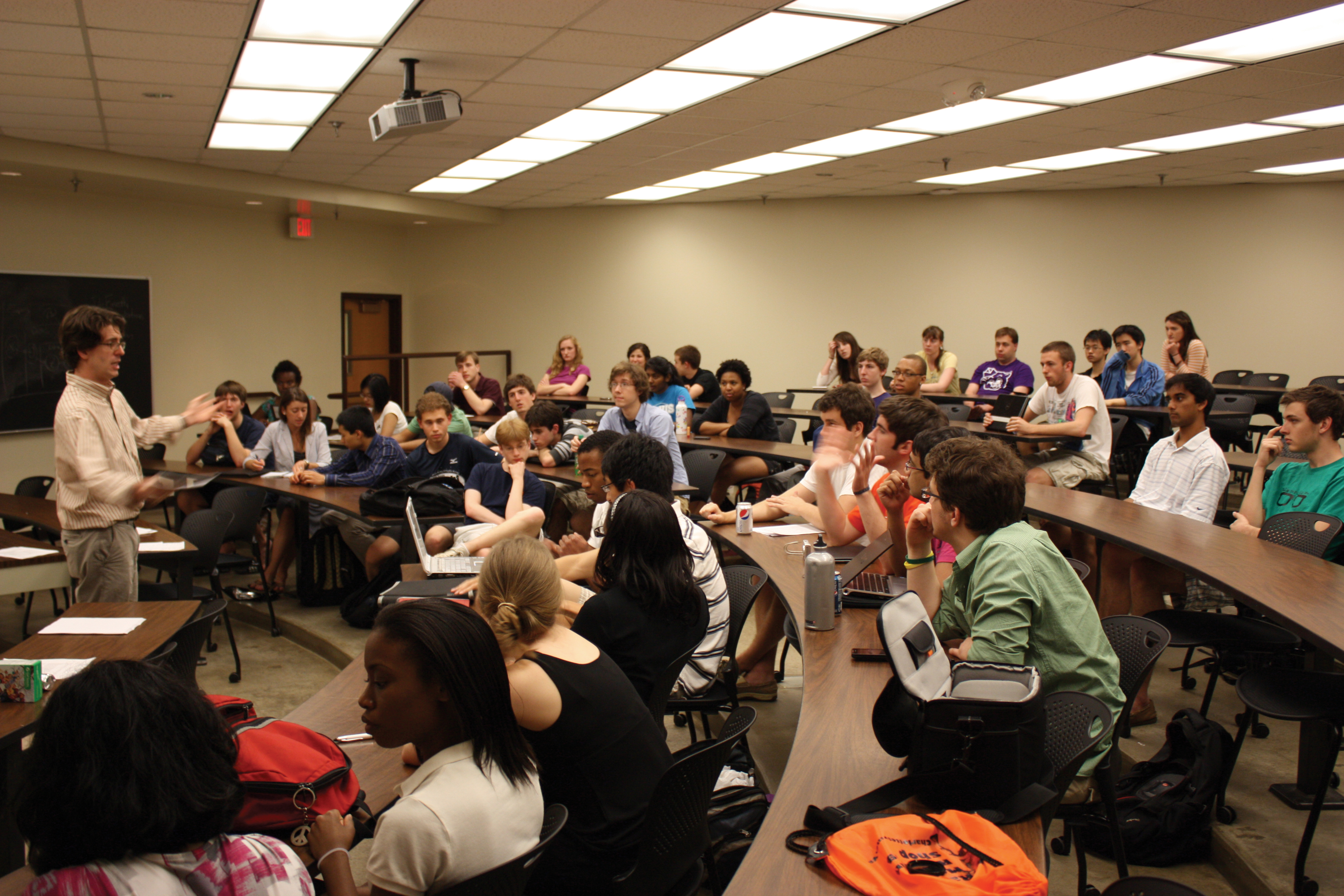This fall, more University of Virginia students than ever will take some classes with podcast tutorials and animations, repeatable practice tests, and online assignments such as producing a blog. The increase in online work will free up time in class for more group projects, discussions and professor feedback.
Ten professors won $10,000 grants to convert nine fall courses to a so-called "hybrid" model. Almost 50 faculty members responded to a July call for proposals from the Faculty Senate and Teaching Resource Center to develop hybrid courses, incorporating the use of digital technology in various ways with classroom time. Most of the revamped courses are in the College of Arts & Sciences and the School of Engineering and Applied Science, and the professors represent eight of the University's 11 schools.
The "Fall 2012 Challenge for Newly Hybrid Technology-Enhanced Courses" is part of U.Va.'s efforts to employ the best technological enhancements to teaching and learning. Analysis and assessment are also built into the course designs.
Funded by U.Va. President Teresa A. Sullivan, the initiative's nine classes will reach more than 1,000 undergraduates and about 60 law students.
In addition, about 20 professors submitted 15 small-grant proposals for second-chance funding; five projects from that pool were selected to receive up to $1,000 each. Those courses enroll nearly 1,800 undergraduates and 40 law students.
Hybrid, or blended, learning combines face-to-face classroom teaching with technology-enhanced instruction to facilitate student learning and incorporate more active-learning activities, such as solving problems. Hybrid courses blend in-person interactions – such as in-class discussions, active group work and live lectures – with Web-based or digital technologies like online course materials and assignments, group websites and blogs.
The blend of traditional classroom activities and online learning depends on the course's nature and subject matter. Many professors have already been using technological enhancements; the recipients will use their grants to introduce or increase technology tools or to go further with course redesign.
"The 41 proposals from faculty around Grounds were very strong, impressing the review committee," said Marva Barnett, founding director of the Teaching Resource Center. "Since the mid-1990s, U.Va. faculty have been doing cutting-edge teaching with technology; now they are adept at using it to flip the classroom so that they can engage students in richer learning during face-to-face time."
What better way to improve a "Computer Networks" course in the Engineering School's Department of Electrical and Computer Engineering than through ramping up the use of technological tools? Professor Malathi Veeraraghavan will make the problem-solving process more transparent with online materials, including videos of herself working out problems, and show different techniques of dealing with network issues.
In biology professor Claire Cronmiller's "Genetics & Molecular Biology" course, students will read the textbook, view customized podcast tutorials and study animations online outside of class. This gives students more responsibility for obtaining significant course content, and class time is freed up for active learning, she wrote in her proposal.
"The current scientific teaching movement promises to convert the passive science lecture class into something more like science: an active way of learning and knowing about the natural world," Cronmiller wrote. "Active teaching strategies give the students ownership of their own learning: They collaborate, brainstorm in groups and establish dialogue with instructors, each other and (most importantly) data."
In another course, "Introduction to Probability," mathematics professor Christian Gromoll will make online tests a repeatable practice. "Students don't wonder how they're doing or how they'll do on the final; there is ongoing feedback as they watch their proficiency and exam scores improve," he wrote in his proposal.
The learning activity gives students more practice and guidance in solving math problems, making it superior to traditional studying for one or two exams per semester, Gromoll wrote in his proposal. It blends naturally with in-class activities and provides assessment with ongoing feedback. The students also get more practice and guidance in solving problems.
He and Mike Hill experimented with the approach in 2008, but the technology wasn't developed enough, and a large support team had to cobble it together, he said.
For Spanish professor Emily Scida's "Elementary Spanish," which packs two semesters into one, the new hybrid model will allow her to make more content available outside of class through online grammar tutorials and other resources, she wrote in her proposal. That will free up class time for more practice in simulating real-life, in-person communication – in Spanish, of course.
Law professor George Cohen, who chairs the Faculty Senate, said the course challenge is one way the Faculty Senate is responding to concerns of the Board of Visitors that the University is not moving fast enough in online education.
Instructors and Hybrid Courses
• Reid Bailey and Michael Smith, "Introductory Systems Engineering"
• Claire Cronmiller, "Genetics & Molecular Biology"
• Christian Gromoll, "Introduction to Probability"
• Colleen Kelly, "Acting I"
• Alison Levine, "Advanced Grammar and Composition in French"
• Emily Scida, "Accelerated Elementary Spanish"
• Sophie Trawalter, "Value and Bias in Public Policy"
• Malathi Veeraraghavan, "Computer Networks"
• J.H. "Rip" Verkerke, "Law Theory & Practice"
Mini-grants
• Margo Bagley and John Duffy, "Patent Law"
• Glen Bull and Mable Kinzie, "Teaching with Technology"
• Matthew Burtner, "Technosonics: Digital Sound Art Composition"
• Charles Grisham, "Introductory College Chemistry and Laboratory"
• Martien Halvorson-Taylor, "Introduction to the Hebrew Bible (Old Testament)"
– by Anne Bromley
Media Contact
Article Information
August 9, 2012
/content/faculty-grant-winners-bring-tech-enhanced-hybrid-courses-online

